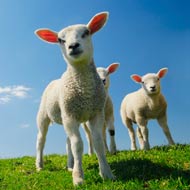Late spring may increase disease risk for newborn animals

SAC Consulting has set out a number of steps farmers can take to tackle the problem of a late spring.
Farmers in Scotland are being warned that a late spring could lead to straw shortages, effectively increasing the disease risk among newborn animals.
The warning comes from specialists from SAC Consulting, part of Scotland’s Rural College (SRUC), who used data from grass variety trials to show that spring will be two-three weeks later than normal.
“A late spring couldn’t be at a worse time. Not only are many farms already short of forage due to last summer’s wet weather, which forced many stock to be housed much earlier than normal, but potentially as problematic is a severe shortage of straw to bed stock,” said Basil Lowman at SAC Consulting.
“Many farmers with suckler herds, block calving dairy herds and housed flocks time calving and lambing so that stock can be immediately turned out on to clean, high-quality spring grass. Being forced to keep animals indoors could pose a major additional disease challenge for newborn animals this spring. With a real risk of a late spring, it is best to plan now and minimise problems later.”
In light of the findings, SAC Consulting has set out a number of steps farmers can take to tackle the problem of a late spring. They include:
• discuss with their vets what preventative treatments, for example vaccinations, might be sensible and cost effective
• sell trading stock as quickly as possible. Even consider selling all or some cattle store rather than finishing them
• prioritise bedding towards youngstock, especially newborns. For example, ensure a dry, well-bedded creep area is made available for new calves
• graze all grass and delay shutting fields up for silage. Consider grazing forward winter sown cereal crops with ewes and lambs or graze cover crops.
SAC Consulting also said that it might be sensible to delay turnout for the earliest calvers and artificially inseminate them indoors.
‘The remainder of the herd could be turned out to grass. This would reduce demand for silage and grazing. It would also allow the youngest calves, which are most susceptible to disease build-up, to be turned out with their mothers,’ it said in a press release.
‘These later calving cows will also benefit from a longer transition in diet before cycling and breeding commences. Overall, this could help avoid an extended calving period often associated with a late spring. The early calving group can then be turned out to grass once they are over seven days inseminated.'



 The latest
The latest